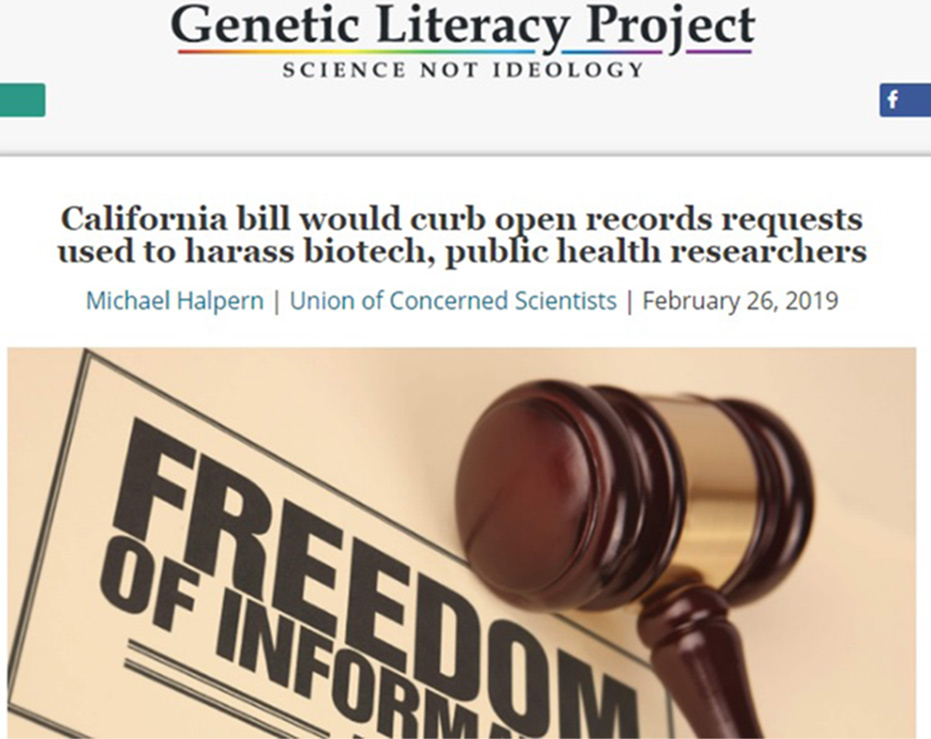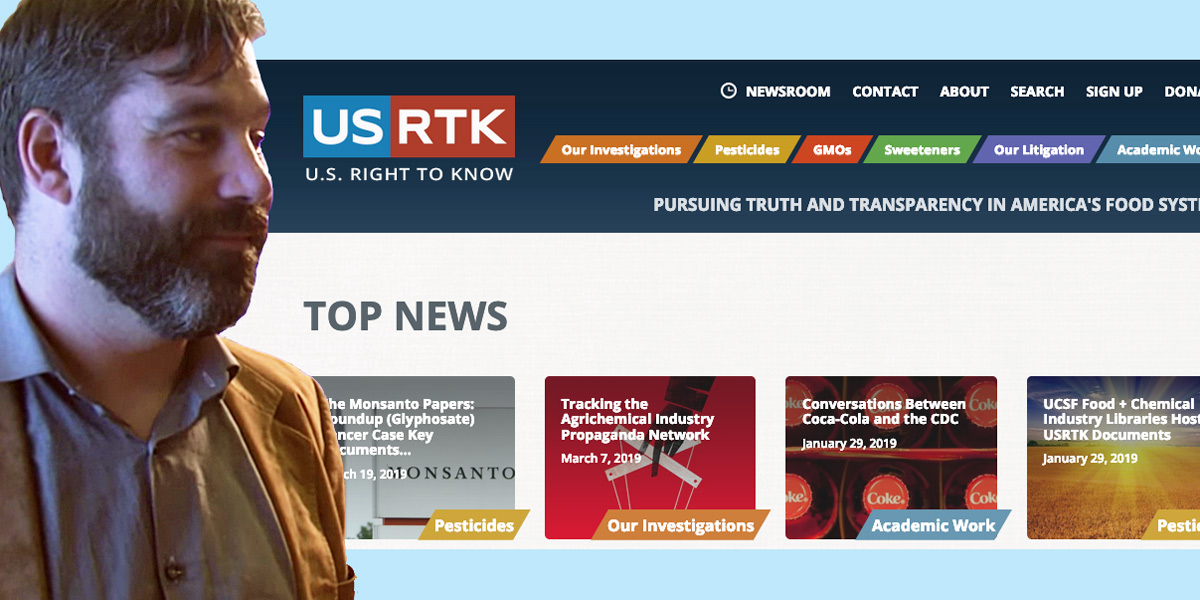
Jonathan Matthews investigates Michael Halpern’s dishonest attacks on group exposing industry links
Update 31 March 2019: We have now heard that Michael Halpern has been in Sacramento to lobby in support of the attack on the Freedom of Information Act (FOIA) in California: Legislation (AB700) to weaken the California Public Records Act by exempting correspondence of professors at California public universities. The good news is that the American Civil Liberties Union (ACLU) has come out strongly in opposition to AB700, as have California journalists. See also US Right to Know's letter in opposition.
Why does the US’s most notable organization for defending independent science against the manipulations of powerful corporations and special interests keep attacking a tiny public interest group over its unearthing of the hidden industry links of public scientists?
That’s one of the questions raised by the journalist Paul Thacker’s recent article, The Union of Concerned Scientists’ quixotic, relentless campaign against transparency.
Thacker’s piece is about UCS’s campaign to limit the use of US freedom of information laws (FOIA) to investigate public university academics. It’s a campaign that Thacker argues is not just nonsensical – one leading FOIA expert has branded it “gibberish” – but also dangerous, as it plays into the agenda of corporations intent on finding loopholes that allow them to hide how they work with public scientists to promote industry messages.
It’s in this context that Thacker describes how Michael Halpern, a leading light of UCS, has taken “direct aim at US Right to Know (USRTK), a small non-profit… that has been uncovering extensive ties between academics and the food industry”. And Halpern hasn’t just taken aim at USRTK once. He has attacked them repeatedly over a four-year period. These attacks, as we shall see, have been deeply dishonest.
In the beginning…
USRTK was founded in January 2015 by Gary Ruskin and Stacy Malkan with the aim of increasing transparency and honesty in the US food system. Their concern was with the food and pesticide industries’ use of front groups, academics, and other third parties, for propaganda purposes and to lobby against transparency and safety regulations.
They issued FOIA requests for the email communications with agrichemical companies, and their PR firms and trade associations, of the University of Florida scientist Kevin Folta and 13 other academics at US public universities. In response, a coordinated campaign of blowback was launched by GMO promoters and groups connected to the agrichemical industry, which aimed at discrediting USRTK by labelling their FOIA requests “bullying” and an anti-GMO “witch-hunt”.
To the surprise of many, this campaign was quickly joined by UCS, who condemned USRTK’s FOIA requests as “overly broad”. This, according to Michael Halpern, meant USRTK’s investigations “constituted harassment”. He also referred in a tweet to the “FOIA bullying” of Kevin Folta.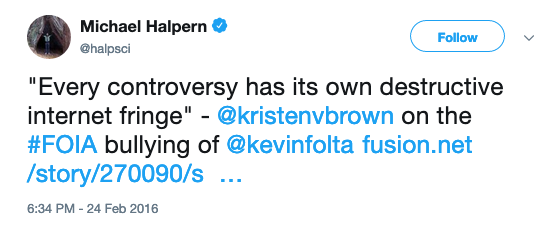
USRTK’s sledgehammer vs Lipton’s scalpel?
Halpern claims he is not opposed to transparency. However, he argues that there is a clear distinction between USRTK’s FOIA requests, which he condemns as “so broad” they’re “like fishing expeditions”, and those of journalists, who he says have filed “more narrow requests [than USRTK] and ended up with more than enough material” for their stories.
As his sole illustration of this crucial distinction, Halpern uses Eric Lipton’s New York Times piece exposing Kevin Folta’s ties to Monsanto. According to Halpern, Lipton’s front-page article was “based on his own [FOIA] requests”. And Halpern has likened the difference between USRTK’s and Lipton’s use of FOIA to that between “a sledgehammer” and “a scalpel”.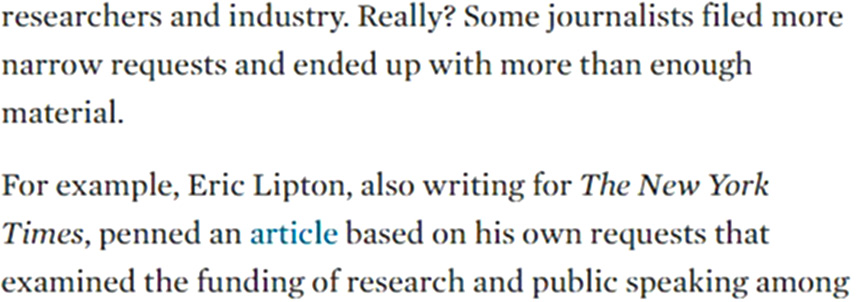
Fake claims about New York Times exposé
But Halpern’s narrative of the bad NGO using FOIA for “harassment” versus the skilled journalist forensically exposing the truth is a total fabrication. As Paul Thacker points out, what Eric Lipton revealed about Folta in the New York Times was derived from the FOIA documents USRTK had passed to him. And although prior to publishing his article Lipton did make his own FOIA request to the University of Florida, this was merely to ask them for the same documents as USRTK had received, so that he had direct evidence of their authenticity.
We know this because when Eric Lipton was subpoenaed in Kevin Folta’s recently dismissed defamation case against Lipton and the New York Times, Lipton described what happened under oath.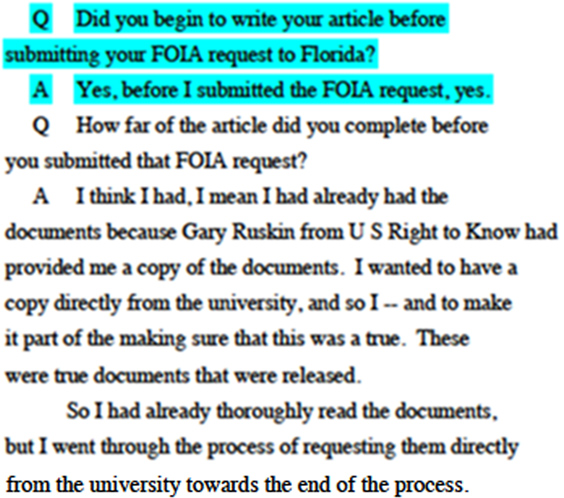
Lipton’s testimony makes clear that his entire Folta exposé was a direct result of studying USRTK’s FOIA documents. So Lipton’s “scalpel” and USRTK’s “sledgehammer” are in reality one and the same, leading Charles Seife, professor of journalism at NYU, to comment, “For UCS to vilify a request from an advocacy group as harassment and praise the identical request when coming from a journalist makes precisely zero sense.”
Vilifying USRTK
It’s not only the New York Times that has benefitted from USRTK’s highly effective use of FOIA. Their work has generated stories about undisclosed links to corporations in Bloomberg, the Boston Globe, Chicago Public Radio, the BMJ, Huffington Post, The Intercept, Mother Jones, Le Monde, and The Nation, among other media outlets. And in 2018 the Society of Environmental Journalists gave the veteran reporter Carey Gillam their Rachel Carson Environment Book Award for Whitewash: The Story of a Weed Killer, Cancer and the Corruption of Science, which in parts draws heavily on USRTK’s FOIA work. USRTK also managed to attract Gillam to join their team as research director on the strength of their work.
Also in 2018, the University of California at San Francisco added 37,149 pages collected by USRTK to their industry documents library to explain corruption in science. And a whole series of academic papers have been published that also draw heavily on the content of USRTK’s FOIA discoveries.
Halpern has had to admit that “important information that should be made public” was obtained via USRTK’s requests. But he has continued to smear them as “anti-GMO activists” who are out “to vilify genetic researchers” via their “overly-broad open records requests”. Halpern’s justification for this condemnation is always the same – the fake contrast with the supposedly “narrower” FOIA request of Eric Lipton.
Halpern must have known
In case anyone thinks Halpern couldn’t have known that Lipton’s FOIA was the same as USRTK’s prior to Lipton’s testimony in 2018, then just reading Lipton’s 2015 article would have made that crystal clear. In email correspondence with Gary Ruskin, UCS had explained that a narrower FOIA meant one that only asked about funding. Asking for anything more than that, Ruskin was told, “infringes on academic freedom”. But Lipton’s article is about way more than the money Folta solicited from Monsanto.
It covers, for instance, the way the biotech industry’s PR firm Ketchum provided Folta with material for possible publication, and the fact that on at least two occasions this material was subsequently published under his name largely unchanged. Lipton also describes how the FOIA’d emails show that Folta “became part of an inner circle of industry consultants, lobbyists and executives who devised strategy on how to block state efforts to mandate GMO labeling”. In other words, Folta was among those advising on the industry’s political campaigns. As Folta received no funding for either activity, this evidence would never have been revealed if USRTK had followed UCS’s advice about FOIA’ing only for financial information. And Michael Halpern couldn’t have read Eric Lipton’s article without knowing that.
Yet even as recently as February of this year, Halpern repeated his claim that Lipton filed “a narrower request”. And in response to Paul Thacker, UCS president Ken Kimmell reiterated UCS’s assertions that USRTK’s requests for public information had been “too broad”. Kimmell also repeated Halpern’s bogus contrast with Lipton: “We found the New York Times’ reporting to be fair and accurate and based on documents that should have been disclosed.”
Gary Ruskin told us that he is glad he ignored UCS’s advice on narrowing his FOIA requests, as if he hadn’t, he very much doubts “that front page New York Times article would have been written, as well as many other stories across the world. I think all the news coverage and the academic papers show that I did the right thing.”
Kiss up, kick down
Gary Ruskin added that he is at a loss to explain why Halpern keeps targeting USRTK and also why he deliberately misrepresents them.
Ruskin said Halpern uses the language and framing of USRTK’s attackers, such as Kevin Folta and Keith Kloor, a journalist who has worked closely with Folta and industry insiders. For instance, while Eric Lipton in his NYT piece refers to USRTK simply as a “nonprofit group”, Halpern follows Folta and Kloor in labelling them “an anti-GMO group” and “anti-GMO activists”, even though USRTK’s position is clearly set out as being not against genetic engineering, but as pro-precaution and pro-transparency in relation to all new food technologies. “So why misstate our position?”, Ruskin asked. It’s equivalent to critics of UCS’s FOIA policy dismissing Halpern and his colleagues as “anti-transparency activists”.
In fact, in order to frame USRTK as “an anti-GMO group”, Halpern has had to ignore not just their public statements, but also the fact that much of their work is on the wider food industry and has little to do with GMOs. As Ruskin points out, “most of my own work is not about the agrichemical industry at all.” That’s why so many of USRTK’s FOIA requests are about aspects of the food industry like soda, sugar, and obesity. “We are a consumer and public health group. Why not report that accurately?”
Another example of what seems to be Halpern’s deliberate inaccuracy can be found in his first blog post attacking USRTK in 2015. He writes of a “sordid and ongoing tale with regard to a group of genetic engineering researchers. In February, an anti-GMO group filed open records requests targeting the work of dozens of scientists…” He links this statement to an article by Keith Kloor. If you follow the link, you find that Kloor more accurately reports that those February requests involved just “a dozen” scientists, not “dozens”. Ruskin told us that the exact number of requests made in February was 14, but “dozens” obviously sounds far more dramatic.
Ruskin also wondered why Halpern creates a false dichotomy between what USRTK does with FOIA and what many journalists, like Eric Lipton, Danny Hakim, Anahad O'Connor, and Candice Choi do. “They also file FOIA requests regarding researchers’ ties to the food and agrichemical industries, so why doesn’t Halpern ever criticise them, rather than pretending they’re doing something completely different to us?”
This could be seen as a classic case of “kiss up, kick down” – kissing the ass of the Pulitzer prize-winning Eric Lipton while kicking the crap out of a tiny non-profit. But that still begs the question as to “Why?” Why has Halpern been so determined to repeatedly go after USRTK with his accusations of harassment and bullying?
Who’s the bully?
Halpern’s promotion of Folta as a victim of USRTK bullying is also deeply ironic. Eric Lipton describes Folta as “among the most aggressive” of GMO proponents, and although Folta himself has made repeated – and often melodramatic – claims of suffering threats and intimidation, there appears to be very little, if any, independent evidence to support their seriousness.
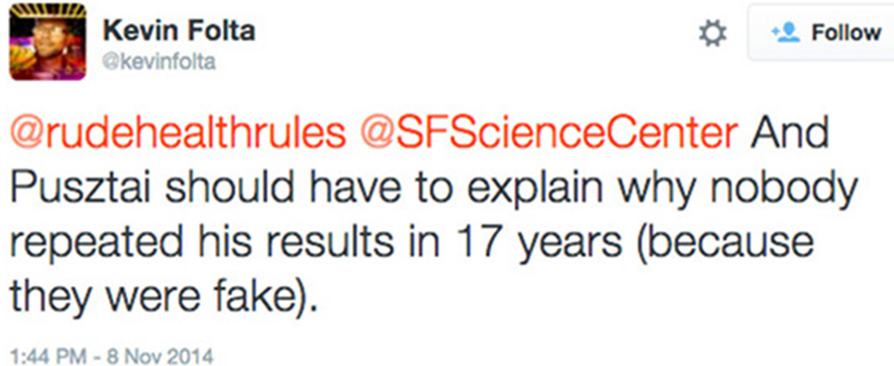
On the other hand, convincing evidence has emerged of Folta’s own involvement in bullying. The Florida Commission on Human Relations found evidence of his involvement in discrimination, retaliation, and bullying in relation to a senior scientist in his department – bullying that seems to have directly contributed to the ending of that scientist’s career.
And on social media Folta has repeatedly vilified scientists he disagrees with, labelling them fraudsters, charlatans, whack jobs and even “morons”. Folta also put into circulation a fake graphic containing false accusations against two scientists he wished to humiliate – one of them a former senior scientist at UCS!
Convenient scapegoat or strategic realignment?
As we have seen, USRTK can no more be said to have bullied Kevin Folta than can Eric Lipton. But while a tiny non-profit disliked by powerful interests obviously provides a much easier target for vilification than a triple Pulitzer prize-winning reporter, Halpern’s persistent misreporting about USRTK is so at odds with the UCS philosophy of scrupulously following the facts on issues they campaign on that it inevitably raises questions as to whether something more than lazy scapegoating could be going on here.
Is it, for instance, a coincidence that Halpern’s defence of Folta and attacks on USRTK began only a matter of months after UCS had ended its own GMO programme, which included critical analysis of GMO lobby claims? UCS’s dismantling of this programme came as a surprise to many because it had been running very successfully for over two decades, but it was particularly controversial.
Despite being scrupulous with the science, UCS came under constant pressure and ferocious criticism, not just from industry but also from leading GMO promoters within the scientific community. Pamela Ronald, for instance, accused UCS of fanning “the flames of misinformation and fear” about GMO crops, and of becoming “increasingly untethered from science”. Those types of smears are difficult and uncomfortable for a science-based organisation to face.
So is it possible that Halpern's attacks on USRTK were in part a signal to the pro-GMO community that UCS was no longer a threat?
Promoting Monsanto’s agenda
UCS has done much fine work over the years standing up for independent scientists and opposing industry manipulation of science and policy. It has also been a well-informed critic of Monsanto’s abuse of science and of the type of agriculture the company so aggressively promotes.
But whatever lies behind it, Halpern’s deeply dishonest attacks on USRTK, combined with his attempts to limit the use of FOIA, have been music to the ears of Monsanto, which has promoted UCS’s work on its website, as has the Monsanto-linked front group, the Genetic Literacy Project.
The very last thing Monsanto and its lobbyists want is more transparency about the company’s use of third parties to promote its messages. So anything that blunts the use of FOIA effectively promotes Monsanto’s agenda. And having UCS vilifying the group that has made the most effective use of this crucial tool has been a massive bonus for the company.